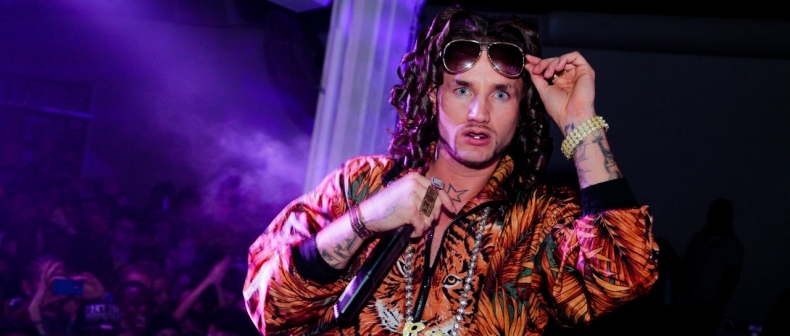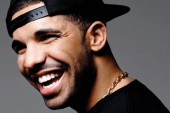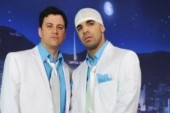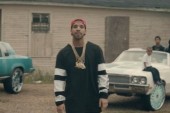
Photo by James Drobik c/o Embrace
By Jordan Sowunmi
2012 has been a whirlwind year for reality-TV star turnt viral rap sensation, Riff Raff. At the beginning of the year, the California-by-way-of-Houston rapper was doing exactly the same thing he had the previous two: Releasing a torrent of made-for-WorldStar music videos and tweeting prolifically, much of it to a small but fervent cadre of fans fascinated by his unique brand of outsider art and/or ironic posturing. Then “Bird on a Wire” dropped. His unexpected collaboration with food-obsessed, New York 90s rap revivalist Action Bronson turned heads as much for how comfortable the two sounded together as the sheer peculiarity of their collaboration.
Before long, his career took flight. He traded an affiliation with Soulja Boy’s feckless vanity label SODMG for Diplo’s Mad Decent and eight-album deal, reportedly worth $3 million. The equally as idiosyncratic James Franco played a character modeled after him in Harmony Korine’s latest feature, Spring Breakers. His “rap game” meme became regular social media parlance. He got Internet zeitgeist writer du jour, Cat Marnell, to star in his “White Sprite” video. Riff Raff capitalized on this momentum with a series of savvy moves: he toured extensively; he increased his video output, punctuating his releases with indisputably catchy choruses (something he is clearly proud of, quipping “rap game Jack Sparrow, you can call me Captain Hook,” on “Freeze Dried”); teaming with fellow 2012 rap surprise successes, Chief Keef and Kitty Pryde; all while keeping the details of his past steadfastly murky.
Is he executing a long-form Andy Kaufmann-esque joke? Are we the butt of the joke for paying attention to him? Does the joke ever end? Does it matter? It’s on this tidal wave of buzz and mystery that Riff Raff rolled into the Hoxton on Thursday night, for his second Toronto show in five months.
When Riff Raff took the stage, clad in a garish tiger-print windbreaker, glistening MTV RIFF RAFF chain, baggy dark jeans, and his hair in outlandish curls, the conspicuously diverse crowd (finance bros next to streetwear bros next to ritzy socialite types next to requisite “sunglasses on indoors” gangstas) erupted in near religious adulation, many pushing forward to snap photos and touch the enigmatic star. In contrast to his Wrongbar show in July where he appeared to be either completely awed by the crowd’s fervor, or out on his feet in a drug-induced detached lassitude, Riff Raff offered the crowd at the Hoxton interaction and showmanship. He mugged for photos, danced goofily, and took to a knee three separate times, only to pop back up when a comely brunette in a short dress and a toque doused his lavish locks with hairspray, each shot ratcheting up the crowd’s excitement as he cycled through YouTube favorites, “Terror Wrist” and “Deion Sandals.”
These flashes of showmanship play into the great big tease that is Riff Raff’s media persona. Despite his ubiquitous online presence and countless interviews, Riff Raff has tried to shield his real background (a note on his Twitter bio describes him as a “professional secret keeper”). He told Gawker he was 26 this year. He said the same thing to MTV, in 2009. (Court records suggest he’s closer to 30.) He’s spent time in Texas (and raps like it), but claims no regional affiliation. In an appearance on the comedy podcast, the Champs, earlier this year, he was evasive and uncomfortable when hosts Neal Brennan and Moshe Kasher grilled him about past. It’s this kind of obfuscation that makes Riff Raff’s most affecting tracks the ones where he drops his oddball shtick for more traditional (and at times, reflective) rap cuts like “Lil’ Mama I’m Sorry” and “Larry Bird,” both of which he performed to a reaction that bordered on delirium.
Above: Riff Raff’s assistant reapplies his hair spray. Below: Riff Raff stares unblinkingly into the zeitgeist as it stares back at him. Photos by James Drobik c/o Embrace.Riff Raff peppered the show with more crowd-pleasing moments of levity. His DJ played Fleetwood Mac’s “Dreams” at the halfway point of the show, a tactic he used at his show in July. While Riff Raff used this interlude to “refresh” and take a ten-minute break at his Wrongbar show, at the Hoxton he stayed on stage with Stevie Nicks’s voice ringing in the air, using the time to dance and lip-sync along, gripping his heart at the high notes and buzzing around the stage in the endearingly dorky manner usually reserved for the shower, or the front of a mirror.
Endearing human touches notwithstanding, Riff Raff’s stage show was not without its flaws. When it was time for “Bird on a Wire,” the DJ lopped off Action Bronson’s surgical open, robbing the track of the necessary counterbalance to Riff Raff’s tongue-twisting, absurdist non-sequiturs.
Still, Riff Raff redeemed himself when it was time to cue up his other major collaboration with similarly outré 2012 rap star, Chief Keef, the 17-year-old Chicago goon rap prodigy who broke into the mainstream this year thanks to a Kanye West-knighted remix of his hit, “I Don’t Like.”
“Shout out to Chief Keef,” Riff Raff said, imploring his DJ to play Keef’s earwormy street single, “Love Sosa,” which he let run all the way through. Despite the obvious similarities between the two (WorldStar dominance, Gawker co-signs, prodigious social media followings), they differ in that while Chief Keef could have conceivably been a star five years ago, Riff Raff’s fame is a singularly 2012 creation. Rap fans have historically placed a premium on authenticity. A rapper’s ability (or inability) to back-up their public persona and supposed biography was just as important as their ability to make hit songs. Those unable to back-up their biographies and tough talk effectively demolished any chance at serious commercial or cultural influence (see: Ice, Vanilla; Rule, Ja). But in the last few years, shifting cultural mores and audience demographics have flipped the authenticity debate on its head. Two of contemporary rap’s biggest crossover stars (Rick Ross, Drake) have biographical details that would have previously rendered both persona non grata to many in the rap establishment. Stylistically and buzz wise, Riff Raff is closer to fellow Tumblr-dominating curios like Odd Future, Das Racist and Kitty Pryde, who have shown there’s a growing niche for rappers whose lives subvert the traditional hip-hop narrative. Many of Riff Raff’s fans — the twenty-something cultural interlopers, earnest rap blog nerds, assorted cool-chasers — identify more with their constructed online personas than their real life counterparts. Riff Raff is the rapper most emblematic of our manufactured public identity — a man who created an image and willed it into reality. When the DJ finally dropped “Cuz My Gear,” it drew the biggest reaction of the night.
Riff Raff ended the show in characteristically inexplicable fashion — shortly after performing “They Figured I Work for Mexico,” he quietly left the stage, without so much as a warning or a goodbye. Many in the audience looked around, puzzled, asking one another whether or not he was coming back. He wasn’t. The crowd filed out.
Seeing him in the flesh didn’t bring anyone closer to cracking the code behind the persona, and no one seemed to mind. So, who is Riff Raff, then? As he told Neal Brennan and Moshe Kasher on the Champs earlier this month, “I am just a person, living on earth. And I’m going to die [eventually].”
At least we got him to admit that.
____
Jordan Sowunmi is a freelance writer in Toronto. Follow him on Twitter @JordanIsJoSo
For more, follow us on Twitter at @torontostandard, and subscribe to our newsletter.














